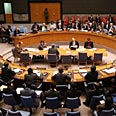

The UN Security Council imposed a third round of sanctions on Iran on Monday for refusing to suspend sensitive nuclear activities.
There were 14 votes in favor, no votes against and one country, Indonesia, abstained.
Israel's Foreign Ministry said it "commends this important decision, which sends an unequivocal message that the international community cannot accept Iran's defiant nuclear plans.
"Iran, whose policy threatens global peace and stability and whose leaders openly threaten Israel, continues to ignore the international community's demands and is consistently violating previous Security Council decisions," the ministry said in a statement.
However, MK Silvan Shalom (Likud), who once served as minister of foreign affairs, belittled the Security Council's decision, saying that the desire to secure Russia and China's support had led to a softening of the original resolution proposal.
"The new sanctions are not effective enough, they will allow Iran to buy more time and obtain the information necessary to build a nuclear weapon. The United States must decide on harsh sanctions independently," he said.
Tehran denies Western charges it seeks nuclear weapons and has ignored three previous Security Council resolutions demanding it freeze its uranium enrichment program, which can produce fuel for nuclear power plants or atomic weapons.
The five permanent council members—the United States, Britain, France, China and Russia—and Germany, which is not on the council, agreed in Berlin on Jan. 22 on a draft text outlining a third round of sanctions against Tehran.
Washington had hoped for a swift vote on the sanctions text but negotiations dragged on for a month and a half until Monday's meeting of the 15-nation council, which adopted the resolution.
Libya, Vietnam and South Africa, as well as Indonesia, had expressed reservations about the resolution, but vigorous Western lobbying managed to persuade all except Jakarta.
'US Intelligence as baseless'
Iran dismissed the resolution as a violation of international law and said it only harmed the Security Council's credibility.
"The credibility of the Security Council ... Is readily downgraded to a mere tool of the national foreign policy of just a few countries," Iran's UN Ambassador, Mohammad Khazaee, told the council.
He reiterated Tehran's position that its nuclear program has always been peaceful and that the current and past UN sanctions resolutions against Iran lack any legal basis.
In a statement on behalf of the five permanent members and Germany, British Ambassador John Sawers told the council the group wanted EU foreign policy chief Javier Solana to meet Iran's chief nuclear negotiator Saeed Jalili to try to resolve the nuclear impasse.
It has been clear since January that the new sanctions would be approved, since they had the backing of all five permanent council members and six non-permanent members.
But the resolution's European co-sponsors—Britain, France and Germany—were anxious to send the strongest possible message to Tehran by getting as close to a unanimous 15-0 vote as they could.
South Africa, Libya, Indonesia and Vietnam had all questioned the wisdom of imposing further sanctions on Iran at a time when the UN Nuclear watchdog in Vienna says Tehran's cooperation with UN inspectors has improved significantly.
The resolution calls for more travel and financial restrictions on named Iranian individuals and companies and makes some restrictions mandatory. Two earlier sanctions rounds were approved unanimously in December 2006 and March 2007.
Diplomats describe the third sanctions resolution as a moderate tightening of the screws from the two previous ones. They said this was the most Washington could get after a surprising US Intelligence report released in December said Iran had scrapped its atom bomb program in 2003.
But the UN Nuclear watchdog is taking seriously new US Intelligence that Washington shared with it on alleged Iranian nuclear bomb activities, and Western diplomats said that would make it more difficult for states to vote against sanctions.
Khazaee dismissed the US Intelligence as "baseless."
Neta Sela, Amnon Meranda and Roee Nahmias contributed to the report















